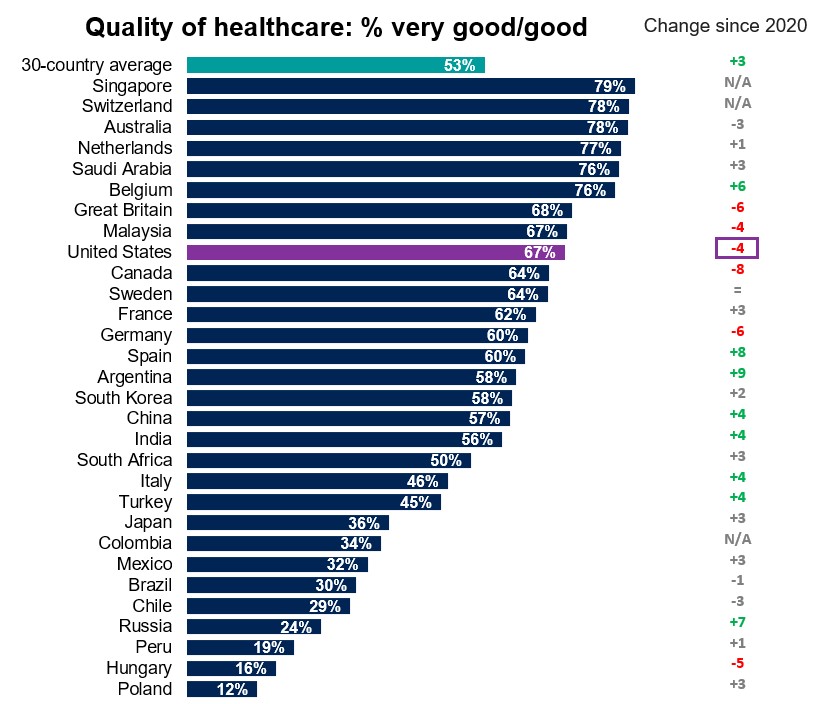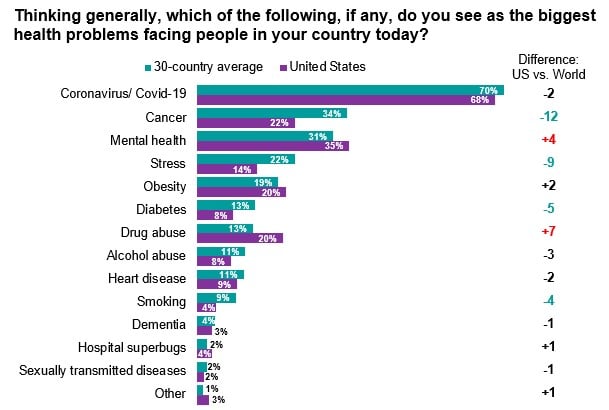The most prevalent health issue plaguing The United States currently is obesity. It’s responsible for several chronic diseases like heart disease. Stroke. Type 2 diabetes, & certain types of cancer. Obesity is largely due To lifestyle choices such as unhealthy diets & lack of physical activity. Influenced by various social & economic factors. Addressing this issue requires a comprehensive approach that includes promoting healthier food options. Encouraging regular exercise. Providing clear nutritional information To consumers, & implementing health policies that support these goals. what is the most common health problem in the United States?
Decoding the Most Prevalent Health Issue Plaguing the United States: A Comprehensive Look. Explore a comprehensive look into The most common health issue in The US. Simple. Easy to understand. Aiming To demystify complex medical terms.
Unraveling America’s Health Crisis: Obesity
An epidemic that has firmly taken hold in our country: is obesity. This creature not only lurks among adults but has its claws in young children as well.
Predominantly an issue of lifestyle and consumption habits. Our society experiences alarming rates of obesity. (what is the most common health problem in the United States)
Data from the National Center for Health Statistics point out that more than one-third (36.5%) of U.S. adults meet the criteria for obesity.
Understanding The Causes Behind Obesity
Simply put. Consuming more calories than your body needs leads you down the route of obesity. But. A closer look reveals that multiple factors play a crucial role like genetics. Environmental elements. Emotional wellbeing. And lifestyle choices.
For instance. Genes influence how our bodies store fat and metabolize food. At the same time. Environments that lack freshness. Affordable healthy meals and safe spaces for physical activity further compound the issue.
Poverty-stricken neighborhoods. Saturated with fast food restaurants but sparse in grocery stores. Contribute to obesity rates. Hence proving that location too plays a pivotal role.
The Chilling Impact of Obesity On Health
More than just a cosmetic concern. Obesity serves as a precursor for a multitude of health woes. Increased body fat leads to heart disease. Stroke. High blood pressure. Type 2 diabetes. And certain types of cancer.
Then there are comorbidities such as sleep apnea. Gallstones and mental health disorders like depression and anxiety.
On a broader scale. Spiraling healthcare costs owing to obesity-related conditions puts immense pressure on healthcare systems. For robust solutions. We need a comprehensive understanding of obesity. Which can be obtained from this valuable resource.
The Approach Towards Obesity Prevention
Recognizing obesity as an epidemic. Multiple initiatives dedicated to addressing this health calamity at various levels are underway. These range from national programs such as Let’s Move! and Shape Up America! to numerous local initiatives.
Efforts are directed towards improving lifestyle habits. Boosting physical activity. And making healthier foods accessible and affordable. However. Countering obesity successfully necessitates collaboration from all sectors of our society. (what is the most common health problem in the United States)
Furthermore. The role of healthcare practitioners in educating patients on maintaining healthy body weights. Counseling them about lifestyle changes and providing resources cannot be overstated. For a deeper dive into mental health and its critical role in obesity. Check out this insightful article.
📌 Key Features of Decoding Obesity in America:
- 🔬 In-depth analysis of causes
- 💊 Exploration of resulting health conditions
- 🗺 Overview of geographical influence on disease prevalence
- 💡 Collation of preventive measures at individual and societal levels
- 📚 Comprehensive resources for deeper understanding
My Experience With Obesity Decoding
As a healthcare practitioner. I understand too well the challenging plight of obese patients. Regularly. I navigate through the labyrinth of their genetic history. Environmental factors. And mental health issues to arrive at the root cause of their condition. My dedication to alleviating their suffering fuels my quest to decode this prevalent health problem plaguing America. (what is the most common health problem in the United States)
Weighing The Economic Impact Of Obesity
High on the list of national concerns is the economic burden imposed by obesity on our healthcare system. Soaring medical costs and increased healthcare utilization pose significant threats to our economy.
An alarming revelation emerges from a study by The Centers for Disease Control and Prevention (CDC) showing that the medical costs associated with obesity are estimated to be $147 billion annually.
In the fight against this epidemic. Economic factors play a crucial role and need to be addressed urgently to pave the way for successful preventive strategies. (what is the most common health problem in the United States)
The Way Forward In Conquering Obesity in America
Overcoming the daunting challenge of obesity requires transformative changes in how we live and eat. Healthy food environments. Promotion of active living. Psychological support. Education. And healthcare interventions form the backbone of this daunting task.
While healthcare systems and policies bear a significant responsibility. Each individual also needs to be accountable for their health choices. (what is the most common health problem in the United States)
For inspirational stories from those who have conquered their battle with obesity. Visit this Bangla Sky News webpage.

Table of content
| Feature/Specification | Description | Related Issues |
|---|---|---|
| Prevalence | Percentage of the US population affected by the health issue | Demographics, Geographic disparities |
| Causes | Underlying factors that lead to the health issue | Genetics, Environmental factors |
| Symptoms | Physical indicators of the health issue | Diagnostic criteria, Co-morbid conditions |
| Treatment options | Methods used to manage or cure the health issue | Pharmacological interventions, Lifestyle changes |
| Mortality rate | Number of deaths caused by the health issue per year | Life expectancy, Quality of life |
| Incidence rate | Number of new cases per year | Risk factors, Disease progression |
| Economic impact | Healthcare costs associated with the health issue | Health insurance, Government spending |
| Social impact | Effects on individuals’ social interactions and quality of life | Mental health, Stigma |
| Preventive measures | Steps to reduce the risk of the health issue | Public health campaigns, Vaccination |
| Research advancements | Developments in understanding and treating health issues | Clinical trials, New treatments |
| Public awareness | Level of public knowledge and understanding of the health issue | Health education, Media coverage |
| Patient support | Resources and assistance available to individuals with health issues | Support groups, Financial assistance |
| Healthcare access | Availability and accessibility of healthcare services for this health issue | Healthcare disparities, Telehealth |
| Racial/ethnic disparities | Differences in health outcomes among different racial and ethnic groups | Health inequities, Cultural competency |
| Gender disparities | Differences in health outcomes between men and women | Barriers to care, Gender-specific conditions |
| Government policies | Regulations and initiatives affecting the health issue | Healthcare legislation, Funding for research |
| Non-profit organizations | Groups working to fight the health issue | Fundraising, Advocacy |
| Patient Literature | Informational materials available to patients and their families | Patient handouts, Online resources |
| Clinical guidelines | Standards for diagnosing and managing health issues | Best practices, Professional guidelines |
| Specialist healthcare providers | Healthcare professionals specialized in treating this health issue | Provider training, Multidisciplinary care |
| Global comparisons | How the US incidence and prevalence compare to other countries | Global health, International initiatives |
What are The most prevalent health issues in The United States?
The most prevalent health issues in The United States change over time & can vary depending on demography. However. Some health conditions continuously plague The country The most. Such as heart disease. Cancer. Chronic lower respiratory diseases like asthma. Stroke. Alzheimer’s disease. Diabetes, & kidney disease. Among others. These diseases contribute enormously To The mortality rate & significantly affect The quality of life of Americans. (what is the most common health problem in the United States)
Why are these health issues so prevalent in The United States?
Several factors contribute To these health issues’ prevalence in The United States. Ranging from lifestyle choices To social & economic conditions. Poor diet. Lack of physical activity. Tobacco use. Excessive alcohol consumption, & obesity are key lifestyle factors contributing To these diseases. Furthermore. Factors such as poverty. Lack of access To quality healthcare, & disparities in health education also aggravate The conditions. (what is the most common health problem in the United States)
Which demographic groups are most affected by these health issues?
In The United States. Certain demographic groups are disproportionately affected by these health issues. For instance. Heart disease is more prevalent among older adults. Men, & people of certain racial or ethnic groups including African Americans. Likewise. Cancer rates vary widely by race. Ethnicity, & socioeconomic status. Chronic diseases like diabetes & kidney diseases are seen more prevalently among African Americans. Hispanics, & Native Americans. (what is the most common health problem in the United States)
What measures could potentially reduce The prevalence of these health issues?
A multifaceted approach is needed To reduce The prevalence of these health issues. It includes improving access To healthcare. Promoting health education & awareness. Implementing preventive measures like screenings & vaccinations, & encouraging healthy lifestyle choices such as regular physical exercise. A balanced diet, & abstaining from harmful behaviors like smoking & excessive drinking. (what is the most common health problem in the United States)
What role does The government play in controlling these prevalent health issues?
The government plays a crucial role in controlling these prevalent health issues via legislation. Public health initiatives. Funding for research, & healthcare policies. Agencies like The Centers for Disease Control & Prevention (CDC) & The National Institutes of Health (NIH) work towards disease prevention & control. Conducting research, & providing health information To The public. Government policies like The Affordable Care Act aim To improve access To healthcare for all Americans by reducing healthcare costs. (what is the most common health problem in the United States)
Conclusion
Let’s take a step back & reflect upon The information we’ve been exploring. Health issues in The United States have been an enormous concern. Affecting millions of people & shakes The healthcare system tremendously. Chronic diseases such as heart disease. Diabetes, & obesity are leading The way as The most prevalent health issues. On top of these. Mental health problems are adding a second layer of crisis not just influencing individual lives. But also families. Communities, & The economy as a whole. (what is the most common health problem in the United States)
The enormity of these healthcare problems typically leads us To believe that there isn’t much we can do as individuals. But that’s not entirely true. Remember. Prevention is The most effective strategy. Making healthy daily choices. Abstaining from harmful habits like smoking. Incorporating regular exercising & adopting a balanced diet can make drastic reductions in The susceptibility To chronic diseases.
Moreover. We mustn’t overlook mental health. Early recognition of symptoms & seeking help without any stigma associated can lead To successful treatment & also contribute To spreading awareness.
To summarise. The significant health issues in The United States are indeed a grave concern. But with a merged effort of government policies & initiatives. Public awareness. Early detection. Suitable treatment, & individual health choices. We can hope To alleviate The impact of these problems eventually.
Keep in mind. You don’t necessarily have To make grand changes; small ones. Persistent efforts can go a long way in maintaining your health & wellbeing. Above all else. Remember that health isn’t merely The absence of disease it’s completely physical. Mental, & social well-being.
Decoding & understanding these challenges are just The first step. The real change will happen when understanding converts into action. Both at an individual & public level. So let’s join hands & take a step forward. Because. Ultimately. Our health matters most.

